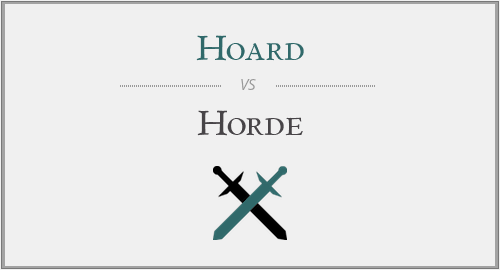Grandfather has a hoard of old gold coins which he like to brag about to a horde of people.
The above sentence contains a pair of homophones; hoard and horde. The homophones (as evident from the sentence) are two words that sound similar but have entirely different meanings. The similarity in the pronunciation of hoard and horde cause a lot of confusion in the writings of young English learners and writers who misuse one word for the other. Can you tell the meanings of the homophones used in the above sentence? Does that make sense to you?
Origin:
Hoard originated from Old English hord (noun), hordian (verb), of Germanic origin; related to German Hort (noun), horten (verb). Horde originated in mid-16th century (originally denoting a tribe or troop of Tartar or other nomads): from Polish horda, from Turkish ordu ‘(royal) camp’.
Hoard as noun:
Hoard is used as a noun in English language where it means a stock or store of money or valued objects, typically one that is secret or carefully guarded.
He came back to rescue his little hoard of gold.
An ancient store of coins or other valuable artefacts is also called a hoard. A hoard of Romano-British bronzes was sold at the exhibition.
Another way in which hoard is used as a noun is to address an amassed store of useful information, retained for future use.
They gathered a hoard of secret information about his work.
Hoard as verb:
Hoard is also used a verb in English language where it describes several actions. When money or valued objects are accumulated and hidden or stored away, they are said to be hoarded.
A compulsive collector hoarded thousands of antiques.
When someone keeps something in one's mind for future use, they hoarded that information or data.
He was ready to avenge a year's worth of hoarded resentments and grudges.

Horde as noun:
Horde is used in English language where it means and represents a large group of people.
A horde of beery rugby fans were startled to meet the team at the pub.
When talking about an army or tribe of nomadic warriors, it is also represented as a horde.
Tartar hordes are rarely found now a days.
In anthropology, horde is used to denote a small loosely knit social group typically consisting of about five families.
Examples:
A hoard of gold coins smuggled to London by a Jewish man who fled Nazi Germany will be returned to his descendents, a coroner has ruled. [BBC News]
Players will battle hordes of zombies, cast powerful spells and must fight to keep their sanity. [Sydney Morning Herald]
He retains the largest hoard of political capital of any leader in any Australian jurisdiction. [The Australian]
Despite all this, the media horde—like a moth to the flame—congregates around the egomaniacal Donald Trump. [Washington Post]
Notably in Saudi Arabia, which hoards a glut of stored oil which is vital to stoke the world’s growing demand, spurred by emerging economies. [The Economist]
Horde or hoard:
To hoard is to squirrel stuff away, like gold bricks or candy wrappers. A horde is a crowd of people, usually, but it can also be a gang of mosquitoes, robots, or rabid zombie kittens. If you gather all the info you can about hoard, and store it away for later, you'll find it comes from the word for "hidden treasure." When you hoard something, you are collecting lots of material, usually of value, in secret. You store these things in case you need them later.
Do you feel the need to hoard this article for future use?




Have a discussion about this article with the community:
Report Comment
We're doing our best to make sure our content is useful, accurate and safe.
If by any chance you spot an inappropriate comment while navigating through our website please use this form to let us know, and we'll take care of it shortly.
Attachment
You need to be logged in to favorite.
Log In